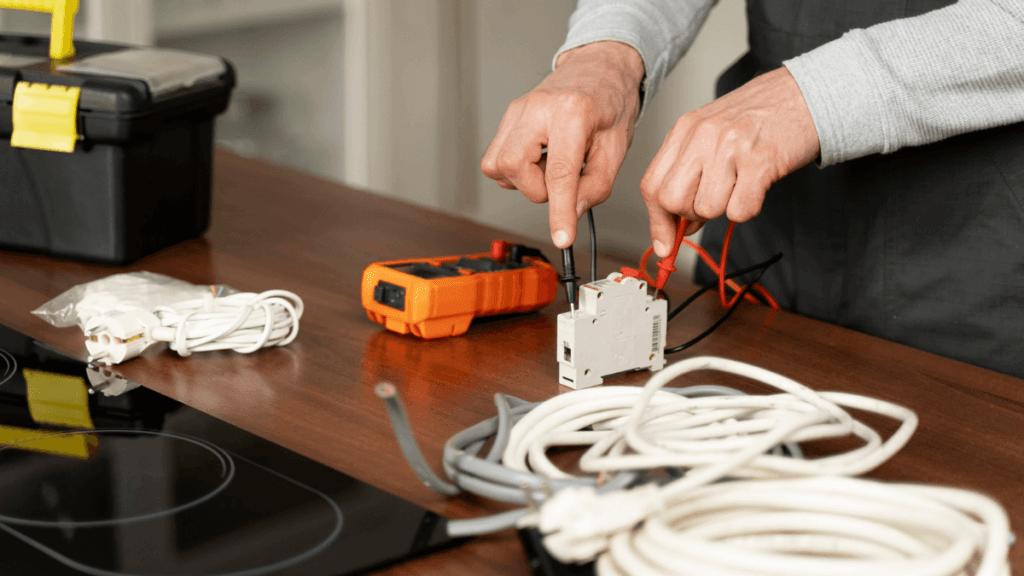Electricians play a critical role in keeping the world connected, powered, and functioning. They are the unsung heroes behind the smooth operation of homes, businesses, industries, and infrastructure, ensuring that electrical systems run safely and efficiently. However, the job is far from glamorous and often demands hard work, expertise, and a high level of precision. So, what is it really like to be an electrician?
Let’s take a closer look at a typical day in the life of an electrician, from early morning starts to the challenges they face throughout the day.
Early Morning: Preparing for the Day Ahead
A typical day for an electrician starts early. Most electricians begin their workday around 7:00 AM or 8:00 AM, depending on the nature of the job and the work environment. The first task is to get prepared for the day by reviewing the job orders or tasks scheduled for that day. These tasks may range from residential wiring to large-scale commercial installations or even emergency repairs.
Here’s what happens during the early morning:
- Gathering tools and materials: Electricians ensure they have everything they need for the day, including their toolkit (pliers, wire cutters, voltage testers, multimeters, electrical tape, etc.). For larger jobs, they might need ladders, drills, or conduit benders.
- Safety checks: Safety is always the priority. Electricians review their personal protective equipment (PPE) requirements, including rubber gloves, insulated boots, safety goggles, and hard hats.
- Preliminary job review: Electricians check their schedules to understand the nature of the tasks ahead and the specifics of each job site.
Before heading out, electricians often take time to assess any potential hazards in the job environment, particularly in construction sites or industrial settings.
Morning Tasks: Residential and Commercial Work
By the time electricians arrive at their first job, it’s typically mid-morning. The type of work they do in the morning can vary significantly depending on the job. If working on a residential property, they may be called to install new lighting fixtures, upgrade an electrical panel, or troubleshoot issues with the home’s wiring. Residential tasks require precision and a keen eye for detail since these systems affect the comfort and safety of the homeowners.
In a commercial or industrial setting, electricians may be tasked with larger-scale projects such as:
- Wiring entire buildings: This could involve setting up electrical systems for lighting, power, and heating.
- Electrical distribution systems: For manufacturing plants or office buildings, electricians install and maintain the systems that distribute electricity throughout the premises.
Electricians often face various challenges in both residential and commercial environments. One of the key aspects of any electrician’s morning is problem-solving. Electrical issues can arise unexpectedly, such as power outages, faulty wiring, or electrical shorts. Diagnosing the root cause of the issue requires both experience and technical knowledge. Electricians use diagnostic tools, like multimeters and circuit testers, to troubleshoot and pinpoint the problem accurately. It’s a challenge that requires not just technical expertise but also the ability to think critically and creatively.
Lunch Break: A Moment to Recharge
After a few hours of hard work, electricians typically take a break for lunch. This may vary depending on the job schedule, but the lunch break is a necessary moment to recharge both physically and mentally. Many electricians eat lunch on-site or in their work vehicles if they’re in a remote location, while others may take the opportunity to visit nearby cafes or restaurants.
During the break, electricians often:
- Reflect on the morning’s tasks: They may take a moment to review their progress and plan for the rest of the day.
- Catch up on communication: This could involve responding to client messages, checking emails, or reviewing upcoming job details.
- Review safety protocols: Some electricians use this time to ensure they are aligned with safety standards for the rest of the day’s work.
While lunch breaks are brief, they are essential in giving electricians a moment to relax before heading back to work.
Afternoon Tasks: Wrapping Up Projects and Addressing Urgent Calls
The afternoon usually consists of completing ongoing projects or responding to new emergency calls. On larger projects, electricians may be working with a team to complete complex installations. They may be involved in installing electrical panels, running wires through conduit, or ensuring that all safety protocols are followed. Every step in these tasks must meet strict local and national electrical codes.
For example, in the afternoon, electricians may:
- Install electrical panels: They ensure that power is distributed properly throughout the building.
- Run wires through conduit: They make sure that wires are safely routed and protected within the walls.
- Test circuits for functionality: After installation, electricians check the circuits to ensure they are functioning properly.
In addition to standard installations, electricians often find themselves responding to emergency calls, which are common in both residential and commercial settings. An electrical fault can cause significant damage, and in many cases, urgent repairs are necessary. Whether it’s a short circuit, malfunctioning circuit breaker, or an appliance that suddenly fails, electricians must work swiftly and efficiently to prevent further damage and restore power to affected areas.
For those working in residential environments, the challenge lies in quickly identifying problems, often in tight spaces like attics, basements, or behind walls. Communication is key when working in homes, as electricians must explain the issue to homeowners, outline the solution, and provide cost estimates. Patience and customer service skills are essential for maintaining positive relationships with clients.
In the afternoon, electricians also perform maintenance work for businesses or large industrial systems. This could involve:
- Checking circuit boards: Ensuring the circuits are functioning correctly and identifying any signs of wear or damage.
- Replacing worn-out components: Electricians change out faulty parts to prevent system failures.
- Preventative maintenance: They conduct routine inspections and maintenance to avoid future issues.
Evening: Ending the Day
The workday for most electricians ends around 5:00 PM or 6:00 PM. However, depending on the job, the hours may extend into the evening, particularly for electricians working on large-scale commercial or industrial projects. These jobs may involve tight deadlines, meaning electricians could work late to meet client expectations or complete critical tasks.
Once the workday concludes, electricians return to the office, or in the case of self-employed professionals, their home office, to complete paperwork. This might include:
- Invoicing clients: Billing for completed work, detailing hours and materials used.
- Logging hours: Ensuring that all time worked is accurately recorded.
- Submitting material receipts: Reimbursing the cost of supplies used for the job.
- Reviewing safety documentation: Ensuring that any potential hazards encountered during the day are documented and addressed.
In some cases, electricians may also schedule jobs for the next day or follow up with clients to ensure satisfaction with the work performed.
The Challenges of the Job
While the life of an electrician can be rewarding, it comes with its challenges. Some of the most common challenges include:
- Physical demands: The job can be physically demanding, involving climbing ladders, bending into tight spaces, or working in extreme temperatures.
- Unpredictable work: Electrical issues may arise unexpectedly, requiring electricians to adapt quickly and resolve problems.
- Long hours and stress: Tight schedules, long working hours, and dealing with difficult clients can be stressful.
Despite these challenges, many electricians find the work fulfilling due to the technical expertise required and the ability to make a tangible impact.
Check also: Wired for Success: How to Grow Your Career and Become a Master Electrician
A day in the life of an electrician is filled with variety, problem-solving, and hard work. From early morning preparation to tackling complex electrical systems and responding to urgent calls, electricians are essential to keeping our world powered and safe. While the job can be physically demanding and sometimes stressful, the rewards are clear.
For those who enjoy hands-on work, technical challenges, and problem-solving, a career as an electrician offers both personal and professional satisfaction.
Related: Essential Computer Skills Every Job Seeker Needs in 2025




